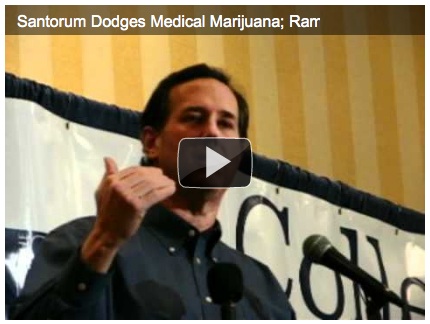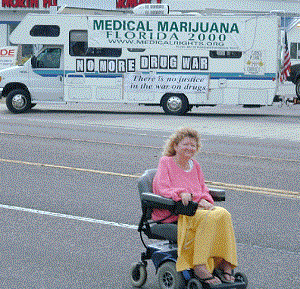Latest
This Week in History
Events and quotes of note from this week's drug policy events of years past. Weekly Chronicle feature here.
This Week in History

Major Study Finds No Lung Damage for Marijuana Smokers
[inline:marijuanasmoke.jpg align=right]Among the most frequent words to fall from the lips of your typical anti-pot propagandist are almost always some sort of insistence that the stuff destroys your lungs. According to them, you hippies are all gonna choke on your bongs, and probably a lot sooner than you think.
This Week's Corrupt Cops Stories
Use Science in Cases Alleging Pregnancy and Drug Use, Orgs and Experts Argue in Court Brief
National Advocates for Pregnant Women
www.advocatesforpregnantwomen.org
For Immediate Release:
Contact: Lynn Paltrow
January 10, 2012
50 Leading Medical, Public Health and Child Welfare Organizations and Experts File Brief Insisting on Science not Stigma in Child Welfare Decisions Involving Pregnant Women and Allegations of Drug Use
Drug War Propaganda and Junk Science No Basis for Child Neglect and Abuse Finding
TRENTON, NJ (Jan. 10, 2012): On January 10, a group of fifty medical, public health and child welfare experts and advocates filed a motion to submit an amicus (friend of the court) brief before the state’s highest judicial authority challenging a finding of neglect against a mother identified in court records as “A.L.,” and an Appellate Division decision that radically expands the scope of the state’s civil child neglect and abuse laws to apply to a pregnant woman in relation to the fetus she carries and sustains.
In this case, New Jersey Division of Youth and Family Services (DYFS) v. A.L., A.L. gave birth to a healthy baby in September of 2007. DYFS argued that positive drug screens for cocaine on A.L. and her newborn were sufficient evidence of harm or imminent harm to find that A.L. had neglected her child. A lower court and the Appellate Division agreed, not only finding neglect in this case but also declaring that a New Jersey’s neglect law could be applied to the context of pregnancy. On October 26, 2011, the New Jersey Supreme Court agreed to review the case.
In their brief, amici focus on the New Jersey Supreme Court’s commitment to the use of reliable scientific evidence in judicial decisionmaking. Amici argued that the lower courts relied on popular assumptions about drugs, pregnant women, and child welfare that lack any foundation in evidence-based, peer-reviewed research.
Lawrence S. Lustberg, Esq. of Gibbons P.C., co-counsel representing amici, explains that “the New Jersey Supreme Court has been a national leader in recognizing that when cases raise scientific, medical, or other technical issues, the evaluation of these issues must be informed by existing scientific knowledge, including expert testimony. This case should be no exception.”
Amici also note that DYFS presented no evidence that the child had suffered any actual injury at birth or at any time after birth, and presented no witnesses with expertise regarding the effects of prenatal exposure to cocaine, what drug test results mean, or the association between a pregnant woman’s drug use and a likelihood of abuse or neglect of a child once born. Nor did DYFS present, or the lower courts consider, the vast body of medical and social science research on these questions.
“Pregnant women and children who are caught up in the child welfare system and who are disproportionately low-income and of color, no less than other people, deserve decisions that are grounded in evidence-based research,” said Emma S. Ketteringham, co-counsel in the case and Director of Legal Advocacy for amici National Advocates for Pregnant Women. Ms. Ketteringham added, “Pregnant women and families should not be deprived of their fundamental rights -- including the right to family relationships -- based on junk science, or no science at all.”
Expert amici explained to the court that medical research makes clear that numerous substances, conditions, and circumstances raise similar or greater risks to fetuses as prenatal exposure to cocaine. While amici were careful to note that they were not suggesting that prenatal exposure to criminalized drugs is benign, they emphasized that current scientific evidence simply does not support judicially re-writing state law to allow for a per se finding of abuse or neglect based solely on evidence of a woman’s use of cocaine or other criminalized drugs during pregnancy.
Amici also noted that there is no research to support the idea that a positive drug test demonstrates harm, risk of harm, or a likelihood of neglect or abuse. They emphasized, however, that there is research finding that threats of punishment, including of loss of child custody, deter pregnant women from care, undermining rather than advancing maternal, fetal and child health.
Wendy Chavkin, MD, MPH, a physician and researcher who has written extensively about the issue of drug use and pregnancy, observed: “These issues have become caught up in other political battles. It is critical that state agencies, like DYFS, and the court base their decision on scientific evidence, not on misinformation and stereotype.”
Ms. A. L. is represented by Clara Licata of the New Jersey Office of Parental Representation.
The amici organizations include: American College of Obstetricians and Gynecologists, Addiction Science Research and Education Center, American Academy of Addiction Psychiatry, American Society of Addiction Medicine, International Centre on Science in Drug Policy, International Doctors for Healthy Drug Policies, National Perinatal Association, National Coalition for Child Protection Reform, Child Welfare Organizing Project, Health Right International (Former Doctors of the World-USA), National Women’s Health Network.
A copy of amicus brief accompanying the motion to submit, including and a complete list of organizations and experts is available at:
http://advocatesforpregnantwomen.org/briefs/NJ%20DYFS%20v.%20AL%20Brief%20of%20Amici%20Curiae.pdf
Additional Resources:
Florida Medical Marijuana Bills Filed
Florida Medical Marijuana Bills Filed

Mitt Romney Promises "A Full Answer" About the Drug War
At least, I hope that's what he meant by this response.

Ron Paul's Least Controversial Idea: Legalizing Drugs
[inline:RonPaul.jpg align=right]I've been so busy marveling at the disturbingly idiotic drug policy positions of various republican presidential candidates that I've largely failed to comment on the candidate who is actually fighting for drug policy reform. Iowa doesn't even have medical marijuana yet, but a guy who wants to end the drug war entirely went in there and shook things up so hard that many were relieved when he only pulled 21.4% of the vote.
Mississippi Public Benefits Drug Test Bill Proposed
Supreme Court Will Hear Florida Drug Dog Case
Tallahassee to Pay in Death of Informant Rachel Hoffman
The city of Tallahassee has agreed to a $2.6 million settlement in the killing of Rachel Hoffman, a collegiate drug scenester whom police s
Tallahassee to Pay in Death of Informant Rachel Hoffman
Supreme Court Will Hear Florida Drug Dog Case

Rick Santorum on Imprisoning Non-Violent Drug Offenders: "The federal government doesn't do that."
From the same presidential candidate who brought you, "I don't know my medical marijuana laws very well," comes yet another mind-bending morsel of jaw-dropping ignorance.

Recreational Drug User Asks Newt Gingrich if She Should Be Arrested
…And for like the first time ever, the most notorious blowhard in the GOP has very little to say.

Mitt Romney Doesn't Know What Industrial Hemp Is
This is…I mean, what can I even…oh whatever, just watch.

Rick Santorum: "I don't know my medical marijuana laws very well."
An instant classic on the campaign trail in New Hampshire.
Pagination
- First page
- Previous page
- …
- 289
- 290
- 291
- 292
- 293
- …
- Next page
- Last page






